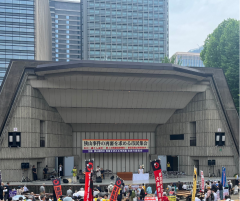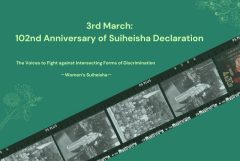Statement: “Problem of Ramseyer’s Article on Buraku: from the Perspective of Human Rights and Non-Discrimination”
March 8, 2021
Alarmed by the article “On the Invention of Identity Politics: The Buraku Outcastes in Japan” written by Professor Mark Ramseyer of Harvard University, IMADR issued a statement to clearly state our views on the article from the human rights and non-discrimination perspective. The statement has been supported by the International Dalit Solidarity Network (IDSN) and Minority Rights Group International (MRG), with whom we have worked together for minority rights.
Please read and endorse the IMADR statement. You can add your voice by filling the form below. Your signature will be published on our website in due course. It may start small, but we can come together to make it a big voice. Thank you for your support!
Statement: “Problem of Ramseyer’s Article on Buraku: from the Perspective of Human Rights and Non-Discrimination” (PDF version)
March 8, 2021
“Let there be warmth in human society, let there be light in all human beings.” This phrase concludes the Suiheisha Declarationi which was adopted on March 3, 1922, 99 years ago, at the founding congress of the National Levelers Association, encouraging all Burakumin to stand up and emancipate themselves from discrimination that they had long been suffering from. The Declaration has been passed down the generations as a textbook in the struggle against Buraku discrimination and for human rights. In the aftermath of the devastating World War II, the United Nations adopted the Universal Declaration of Human Rights (UDHR) in 1948. Later, the International Convention on the Elimination of All Forms of Racial Discrimination (ICERD) was adopted in 1965 as the first international human rights instrument that embodies principles of the UDHR. In the preamble, it states, “Convinced that the existence of racial barriers is repugnant to the ideals of any human society.” This philosophy is exactly equal to the core of the Suiheisha Declaration adopted by Burakumin preceding it by 43 years.
Yet now, that Levelers (Suiheisha) Association is being demonized by the article entitled “On the Invention of Identity Politics: The Buraku Outcastes in Japan” (Review of Law and Economics, Volume 16 Issue 2)ii written by Professor Mark Ramseyer of Harvard University. In his article, it reads, “the ancestors to most burakumin did not tan animal skins or work in the leather trade. They did not work in a guild. Instead, most burakumin trace their ancestry a loose collection of unusually self-destructive poor farmers. The nineteenth and twentieth century buraku were dysfunctional in ways that track under-class communities the world over.” (page 2)
International Movement Against All Forms of Discrimination and Racism (IMADR) iii is alarmed at his rhetoric. Buraku discrimination originated from the pre-modern social status in Japan has persisted in our society, and it has gradually been recognized by the international community that Buraku discrimination is defined as discrimination based on work and descentiv and analogous to discrimination based on caste rampant in South Asia. IMADR has jointly worked with the oppressed communities in the world including Buraku to eliminate discrimination by applying the international human rights standards.
In 1961, the Council on Dowa (Buraku) Measures was created as an advisory body to the General Administrative Agency of the Cabinet (current Cabinet Office). In 1965, it submitted the report in response to the request made by the Prime Minister regarding future policies for the solution of Dowa problem. In the preamble, the report emphasized the importance of the solution of Buraku problem by stating, “Dowa problem is a problem concerning freedom and equality which are universal principles of human beings, and linked with fundamental human rights guaranteed by the Constitution of Japan. ,,,, Solution of Dowa problem is a duty of the state and national task as well.” It continued, “Buraku discrimination in the modern society is, in short, an infringement of civil rights and freedom,” indicating the deprivation of freedoms and rights in employment, housing and movement and marriage that Burakumin had long suffered. Indeed, it is the infringement of rights guaranteed under the International Covenant on Civil and Political Rights (ICCPR) adopted by the UN in 1966.
Following the report of the Dowa Measures Council, the Law on Special Measures for Dowa Projects was enacted in 1969, and various measures were implemented for the consecutive 33 years until the law expired in 2002. As provided in Article 2.2 of the ICERD and Article 26 of the ICCPR, special measures or positive actions shall be taken by a state to protect and remedy victims of discrimination. In his article, Professor Ramseyer describes Dowa special measures in the following way, “After the war, the extortion steadily picked up pace. During the early post-war years, the buraku leaders and organized crime syndicates began to work togetherto extract funds from local and prefectural governments. Starting in 1969, they began to collect from the national government – and the extraction dramatically picked up pace.” (page 4)
In its Concluding Observations of the review of the periodic report of the Government of Japan (CERD C/JPN/CO/3-6, para 19), the UN Committee on the Elimination of Racial Discrimination (CERD) expressed its concern over the results of the Dowa special measures and continuing challenges in solving Buraku problem.
It reads; Noting with interest the recognition by the State party of discrimination against Burakumin as a social problem and the achievements of the Dowa Special Measures Law, the Committee is concerned that the following conditions agreed between the State party and Buraku organizations upon termination of the Dowa Special Measures in 2002 have not been fulfilled to date: full implementation of the Convention; the enactment of a law on human rights protection; and a law on the promotion of human rights education. The Committee regrets that there is no public authority specifically mandated to deal with Burakumin discrimination cases and notes the absence of a uniform concept used by the State party when dealing with or referring to Burakumin and policies. Further, the Committee notes with concern that although socio-economic gaps between Burakumin and others have narrowed for some Burakumin, e.g. in the physical living environment and education, discrimination remains in areas of public life such as employment, marriage, housing and land values. It further regrets the lack of indicators to measure progress in the situation of Burakumin (arts. 2 and 5).
The observations of the CERD conflict with the view of the article of Professor Ramseyer. The observations do not show any slightest indication of such a criminal act. There is the only fact about measures taken by the state for damages brought by century-long-discrimination and discrimination that remains deeply rooted.
Fourteen years after the termination of the Law on Special Measures, the Act on the Promotion of the Elimination of Buraku Discrimination v was enforced in 2016 in acknowledgment of the fact that “Buraku discrimination is based on the social status hierarchy built in the process of historical development of Japanese society, and it still occurs on the daily basis.vi” Before the implementation of the Act, the Government conducted the survey in 2017 to comprehend actual conditions of Buraku discrimination. It revealed that there were not a few people who searched sensitive information relating Buraku districts or Burakumin on the Internet with a discriminatory intention.
Buraku discrimination has not yet been eliminated. Discrimination against other minority communities has also not yet been eliminated. In the meantime, an attempt to distort or deny the history of discrimination against minority communities has been taken here and there and one after another. We continue our struggle with the oppressed minority communities believing in the universality of human rights that all persons are equally entitled to all rights and freedom.
The International Movement Against All Forms of Discrimination and Racism (IMADR)
Supported by: International Dalit Solidarity Network (IDSN)
Minority Rights Group International




